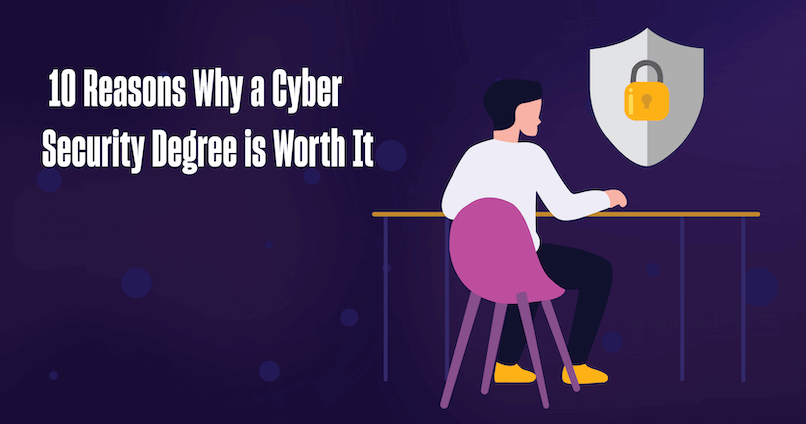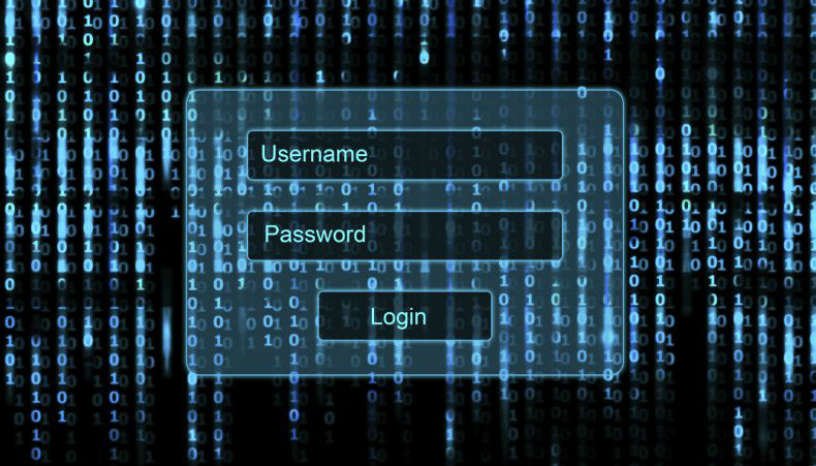There are countless reasons why a cyber degree is worth the investment. In fact, by one crucially important metric you could say there are 3.4 million reasons — that’s the estimated number of cybersecurity positions that need to be filled. And the salaries are matching the demand with the average pay for a cybersecurity professional topping $128,000 — with some salaries much higher.
Why are there so many unfilled cybersecurity jobs? And why is this fast-growing industry paying top dollar for top talent? According to a Forbes article, cyber crime is projected to cost $10.5 trillion per year by 2025.
Bottom line: The threat is urgent, the stakes are incredibly high and there aren’t nearly enough highly educated and qualified workers to meet the demand. That’s why companies are paying high salaries for well-trained cybersecurity professionals — and that’s also why earning a cybersecurity master’s degree could be the best investment you ever make.
Companies Hiring Cybersecurity Graduates
Cybersecurity professionals are in high demand across a wide variety of industries. A recent search for cybersecurity jobs on LinkedIn resulted in the following companies hiring for these types of positions:
- Cardinal Health
- Booz Allen Hamilton
- Comcast
- Citizens
- Leidos
- Deloitte
- Fidelity Investments
- Liberty Mutual Insurance
- Centers for Disease Control and Prevention
- Fan Duel
Some industries are feeling the need more than others. These are some of the best industries for cybersecurity job seekers:
- Financial services
- Government
- Healthcare
- Manufacturing
- Retail
[PDF GUIDE] Eight Important Considerations for Getting a Cybersecurity Degree
Cybersecurity Master’s Degree vs. Certifications
Now let’s examine the difference between obtaining a master’s degree in cybersecurity and other industry-specific certifications:
| Factors | Master’s Degree | Certifications |
| How long the degree or certification is good for | Does not expire | Most have to be renewed |
| How skills are measured | Through writing, projects, classroom discussion and critical thinking | Exam |
| Overall goals | To expand your overall cybersecurity experience and knowledge | To pass the certification exam |
| Skills demonstrated | Leadership, working with others, demonstrated tenacity in learning | Test-taking skills and specific subject matter |
| Cost | One-time cost | There are costs for individual certification exams that could add up, depending on how often they need to be renewed and the longevity of your career |
The Value of a Master’s Degree in Cybersecurity
With increasing awareness and concern over the growing cyber threats facing organizations, governments and individuals alike, many universities and colleges have created graduate degree programs in cybersecurity.
While many of these programs are still in their infancy, others have been thoughtfully designed with input from field practitioners, local and national stakeholders, and industry thought leaders with the goal of training cybersecurity professionals with lifelong learning skills and the ability to defeat adversaries from theoretical as well as tactical perspectives.
Today, most employers seek a combination of both experience and education and, while a master’s degree is not necessary for all jobs, according to Tripwire, the advantages of earning a master degree in cybersecurity include higher pay, job security and expanded career opportunities. Not all cybersecurity education is created equal, however, which is why it is important to be especially discerning when choosing a graduate program.
[Related Post] 8 Questions to Ask Before You Invest in a Cybersecurity Graduate Degree >>
10 Reasons to Get a Master’s Degree in Cybersecurity
- A Degree in Cybersecurity Equals Job Security
If there was ever a time to enter the cybersecurity field, it is now. With cyber threats and attacks increasing in both frequency and sophistication, the demand for cybersecurity professionals is far outpacing the supply. This means that for qualified cybersecurity specialists, job security is practically guaranteed.
- Cybersecurity Professionals Earn High Salaries
Due to the severe shortage of skilled workers, cybersecurity professionals are among the most highly compensated in the technology sector.
- $93,519 is the average salary for an entry-level Cybersecurity Analyst [ZipRecruiter].
- $101,550 is the median salary for a Cybersecurity Engineer [PayScale].
- $113,060 is the median salary for an IT Security Specialist [Indeed]
Once you climb further up the cybersecurity career ladder, for example to Chief Security Officer (CSO) or Chief Information Security Officer (CISO), your earning potential gets considerably higher.
- $239,839 is the average CISO salary. [Salary.com]
- $147,697 is the average CSO salary in the U.S. [Comparably]
To sum things up, the cybersecurity job outlook is fantastic — salaries are high and demand is soaring. But in order to land the best jobs in cybersecurity with the best companies, you need a degree and when it comes to cybersecurity, the higher the degree, the better.
- Investment in Advanced Cybersecurity Education Pays for Itself
Tuition for a master’s degree varies from school to school but the total cost of a degree in cybersecurity will typically run anywhere from $20,000-$70,000. While that is a significant investment, the payoff proves it is worth it.
- Cybersecurity Career Options Are Growing Faster Than Other Sectors
The U.S. Bureau of Labor Statistics reports that the job market for information security analysts is growing at a rate of 32%, which the BLS characterizes as “much faster than (the) average” for other lines of work. And while the opportunities and job openings in the cybersecurity field are many, the education level needed to land these jobs can be high. According to CyberSeek, 28% of employers hiring for a cybersecurity architect position required or preferred a graduate degree (23% for a cybersecurity engineer; 22% for a penetration tester). Yet, for those with the right education and experience, the opportunities are vast — with job openings in almost every state and across every sector, both private and public.
In many cases, a master’s degree is either preferred or required for upper-level jobs.So what are some of the top cybersecurity jobs and career paths? Let’s break it down:
- Cybersecurity Analyst: This position may also be known as an information security analyst, IT security analyst and senior security analyst. A cybersecurity analyst plans and implements security measures to protect the computer networks and systems of a company or organization. You may also help create a disaster recovery plan, which an IT department will follow in the event of a breach or security emergency.
- Security Auditor: A cybersecurity auditor works with companies and organizations to provide comprehensive audits of online security systems, which typically include a detailed report about existing systems, analyses of whether the systems run efficiently and recommendations on changes to protocols and infrastructure.
- Cybersecurity Specialist: This position, often called an information (IT) security specialist or network security specialist, plays a central role in securing the information systems of businesses and other organizations.
- Cybersecurity Architect: The responsibilities of this often senior-level position is to plan, design, test, implement and maintain an organization’s computer and network security infrastructure.
- Cybersecurity Consultant: Also known as a security specialist, security consultant, physical security specialist and personnel security specialist, these consultants are independent contractors employed by companies across all industries to safeguard systems, networks and valuable data.
- Network Administrator: Listed as one of the top 10 in-demand tech jobs for 2020, the responsibilities of this position include monitoring the network, ordering network equipment, configuring/racking/testing networking equipment and network troubleshooting.
- Penetration Tester: This position involves identifying security weaknesses in both systems and policies.
Other career paths from CyberSeek include:
- Cyber Crime Analyst/Investigator
- Cybersecurity Manager/Administrator
- Cybersecurity Engineer
- Flexible Cybersecurity Degree Programs Are Available
Flexibility is of great importance for working adults. The option to obtain a degree online while balancing school with a full-time job and family obligations has proven to be a career game-changer for many cybersecurity professionals.
Today, many colleges and universities offer online options, either hybrid programs or 100% online degrees. In addition to flexibility, online learning offers key benefits for students, including the ability to access the best cybersecurity programs, professors and universities no matter where you are located; pay less for materials (costly textbooks are often replaced with digital content that can be viewed online or printed); and interact with students from around the country and globe.
[PDF GUIDE] Eight Important Considerations for Getting a Cybersecurity Degree
- Cybersecurity Skills: You’ll Learn the Basics – Plus Leadership, Management and More
One of the most important benefits of earning a master’s degree in cybersecurity is the additional managerial and leadership training you will receive. In most technology undergraduate programs these types of business skills are not taught as a part of the curriculum. However, in order to advance in the field and land high-ranking leadership positions, you’ll need to possess the right qualities, including keen business acumen.
For example, in addition to cybersecurity leadership skills, students in the University of San Diego’s highly regarded Master of Science in Cyber Security Operations and Leadership are taught cybersecurity theory and how to turn that theory into practice, gaining specific knowledge and skills in the areas of technology, law, policy, compliance, governance, intelligence, incident response and management.
The USD program places significant emphasis on immersive experiences, which gives students the real-world exposure they need to be truly effective in the field.
Courses in the USD curriculum range from Foundations of Cyber Security to Cyber Incident Response & Computer Network Forensics. Additional courses include:
- Applied Cryptography
- Secure Systems Architecture
- Cyber Security Risk Management
- Cyber Security Operational Policy
- Management and Cyber Security
- Secure Software Design and Development
- Cyber Intelligence
- Network Visualization and Vulnerability Detection
- Networking Opportunities Abound in Cybersecurity Graduate Programs
For anyone looking to make the most out of their graduate program, networking is key. Because graduate school attracts groups of like-minded people with similar interests in specific areas, such as cybersecurity, it is the perfect place to connect with peers, alumni and faculty.
The connections made in graduate school can not only help you while you are completing your degree, by offering additional knowledge, insight and variety of perspectives, but can also be immensely helpful upon graduation as you look to launch or advance your career.
Additionally, the University of San Diego online master’s degree is structured to emphasize maximum engagement with experienced faculty experts, as well as fellow cybersecurity professionals from around the country. This represents a valuable opportunity to engage with and learn from peers across all sectors of the cybersecurity industry.
- Financial Incentives are Abundant for Cybersecurity Students
With cybercrime professionals in such high demand, both in the private and public sector, there are a number of financial incentives that are now being offered to those who wish to pursue a degree in cyber security. The Center for Cyber Safety and Education grants a number of scholarships to those entering the field. For females, various scholarships are available for women in cybersecurity. Two major scholarship programs are funded by the U.S. government — the Information Assurance Scholarship Program (IASP) and the National Science Foundation Scholarship for Service (SFS). Also, Yellow Ribbon schools, such as the University of San Diego, offer support to veterans through yearly scholarship money that is then matched dollar for dollar by the VA. At USD that equals roughly $17,000 per year.
- Cybersecurity Offers Unique and Interesting Ways to Make a Difference
For example, some cybersecurity specialists are focused on using creative methods to attack the very systems they are aiming to protect, in order to discover vulnerabilities that could be exploited by hackers.
Today, there are more and more so-called bug bounty programs in which skilled white-hat hackers work to disrupt the illegal and destructive efforts of their black-hat counterparts by finding and fixing weak spots in cybersecurity defense systems.
- Cybersecurity Work is Meaningful and Vitally Important
Perhaps you’ve read troublesome reports in The New York Times or The Washington Post about America’s next generation of weapons systems being vulnerable to cyber attacks and hacking from our enemies. A career in cybersecurity can bring personal and professional fulfillment while helping to defend one’s country.
Corporations in all industries need robust cybersecurity defenses to guard against inevitable intrusions from hackers that can cost companies millions, even billions of dollars. But the stakes are even higher when it comes to America’s future safety and security, which will increasingly depend on our ability to combat high-tech warfare waged using advanced computer technology.
Many cybersecurity professionals, including military veterans seeking new challenges, are responding to the call. At the Department of Homeland Security, the National Institute for Cybersecurity Careers and Studies offers advice, support, toolkits and free training to veterans interested in cybersecurity — noting that the demand for cybersecurity experts is “growing 12 times faster than the current U.S. job market,” making the field “one of the most highly sought-after careers in the country.”
Earning an advanced degree in cybersecurity is not the endpoint — you’ll need to commit yourself to a continuous learning curve in this fast-changing field — but a degree can help you transform your professional trajectory and increase your earning potential while making a positive impact on society.
The University of San Diego offers two innovative graduate degree programs designed to be completed in as little as 20 months — the online Master of Science in Cyber Security Operations and Leadership and the online or on-campus Master of Science in Cyber Security Engineering (designated as a National Center of Academic Excellence in Cybersecurity).
Citations
Fortune Education, “The cybersecurity industry is short 3.4 million workers—that’s good news for cyber wages.” https://fortune.com/education/articles/the-cybersecurity-industry-is-short-3-4-million-workers-thats-good-news-for-cyber-wages/
ZipRecruiter, “Cyber Security Professional Salary.” https://www.ziprecruiter.com/Salaries/Cyber-Security-Professional-Salary
Forbes, “10.5 Trillion Reasons Why We Need A United Response To Cyber Risk.” https://www.forbes.com/sites/forbestechcouncil/2023/02/22/105-trillion-reasons-why-we-need-a-united-response-to-cyber-risk/?sh=10257a383b0c
CSO, “The cybersecurity skills shortage is getting worse.” https://www.csoonline.com/article/566749/the-cybersecurity-skills-shortage-is-getting-worse.html
LinkedIn, “Cybersecurity Jobs in the United States.” https://www.linkedin.com/jobs/search/?currentJobId=3720885968&keywords=cybersecurity&origin=JOBS_HOME_SEARCH_BUTTON&refresh=true
TripWire, “4 Reasons to Get Your Master’s Degree in Cyber Security.” https://www.tripwire.com/state-of-security/4-reasons-to-get-your-masters-degree-in-cyber-security
University of San Diego, “9 Ways to Evaluate the Best Cyber Security Degree Programs.” https://onlinedegrees.sandiego.edu/how-to-pick-best-online-cyber-security-program/
ZipRecruiter, “Entry Level Cyber Security Analyst Salary.” https://www.ziprecruiter.com/Salaries/Entry-Level-Cyber-Security-Analyst-Salary
PayScale, “Average Cyber Security Engineer Salary.” https://www.payscale.com/research/US/Job=Cyber_Security_Engineer/Salary
Indeed, “Entry level cyber security salaries in United States.” https://www.indeed.com/career/it-security-specialist/salaries
Salary.com, “Chief Information Security Officer Salary in the United States.” https://www.salary.com/research/salary/benchmark/chief-information-security-officer-salary
Comparably, “Chief Security Officer Salary.” https://www.comparably.com/salaries/salaries-for-chief-security-officer
Univeristy of San Diego, “What You’ll Pay vs. What You’ll Get: Examining the Lifetime Value of a Master’s Degree in Cyber Security.” https://onlinedegrees.sandiego.edu/lifetime-value-of-a-masters-degree-in-cyber-security/
U.S. Bureau of Labor Statistics, “Information Security Analysts.” https://www.bls.gov/ooh/computer-and-information-technology/information-security-analysts.htm
University of San Diego, “How to Land the 9 Best Jobs in Cybersecurity [Includes Salary Data].” https://onlinedegrees.sandiego.edu/best-jobs-in-cyber-security/
CyberSeek, “Cybersecurity Career Pathway.” https://www.cyberseek.org/pathway.html
University of San Diego, “Cybersecurity Analyst Career Guide.” https://onlinedegrees.sandiego.edu/cybersecurity-analyst-career-guide/
University of San Diego, “How to Become a Security Auditor [+ Career & Salary Guide].” https://onlinedegrees.sandiego.edu/cyber-security-auditor-career-guide/
University of San Diego, “How to Become a Cybersecurity Specialist [+ Career & Salary Guide].” https://onlinedegrees.sandiego.edu/cyber-security-specialist-career-guide/
University of San Diego, “Cybersecurity Architect [Career Outlook, Job Duties, Salaries].” https://onlinedegrees.sandiego.edu/cyber-security-architect/
University of San Diego, “Is a Career as a Highly Paid Cybersecurity Consultant Right for You?” https://onlinedegrees.sandiego.edu/how-to-become-cybersecurity-consultant/
University of San Diego, “How to Become a Network Administrator [Career & Salary Guide].” https://onlinedegrees.sandiego.edu/network-administrator-career-salary-guide/
University of San Diego, “Penetration Testers on the Front Lines of Cyber Security.” https://onlinedegrees.sandiego.edu/vulnerability-and-penetration-testing/
University of San Diego, “9 Ways to Evaluate the Best Cyber Security Degree Programs.” https://onlinedegrees.sandiego.edu/how-to-pick-best-online-cyber-security-program/
University of San Diego, “Master of Science in Cyber Security Operations and Leadership.” https://onlinedegrees.sandiego.edu/masters-cyber-security-operations/
Center for Cyber Safety & Education. https://www.iamcybersafe.org/s/
University of San Diego, “A Guide for Women in Cybersecurity.” https://onlinedegrees.sandiego.edu/women-cyber-security-reasons-to-enter-field/
Dark Reading, “White-Hat Bug Bounty Programs Draw Inspiration from the Old West.” https://www.darkreading.com/application-security/white-hat-bug-bounty-programs-draw-inspiration-from-the-old-west
The New York Times, “New U.S. Weapons Systems Are a Hackers’ Bonanza, Investigators Find.” https://www.nytimes.com/2018/10/10/us/politics/hackers-pentagon-weapons-systems.html
The Washington Post, “The Cybersecurity 202: The Pentagon’s new weapons systems are vulnerable to cyberattacks, government watchdog finds.” https://www.washingtonpost.com/news/powerpost/paloma/the-cybersecurity-202/2018/10/10/the-cybersecurity-202-the-pentagon-s-new-weapons-systems-are-vulnerable-to-cyberattacks-government-watchdog-finds/5bbcdf681b326b7c8a8d18dd/?noredirect=on
National Initiative for Cybersecurity Careers and Studies, “Cybersecurity for Veterans.” https://niccs.cisa.gov/education-training/cybersecurity-veterans





